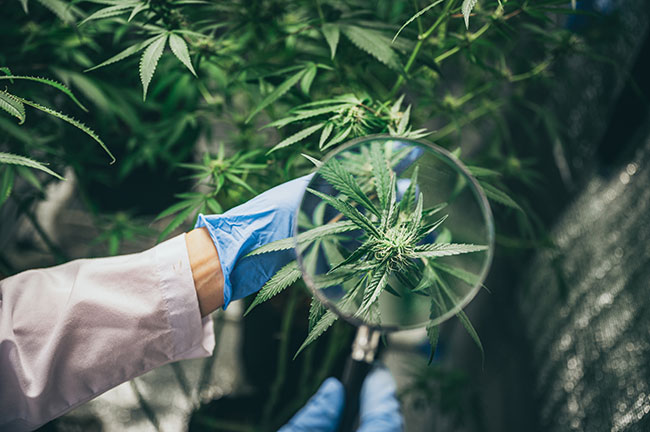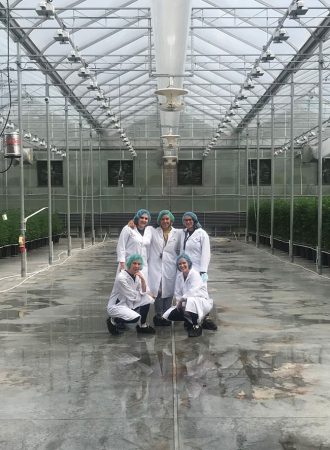
Features
The war for talent in cannabis: Exploring the labour gap
When it comes to recruiting and retaining talent in today’s highly competitive cannabis industry, companies need to be organized, polished and efficient — not to mention willing and able to showcase its values on a daily basis.
May 23, 2022 By Treena Hein
 In the cannabis market, certain jobs require certain technical skills, but LPs can't forget hiring people with strong soft skills, like the ability to learn quickly, cope in uncertain or dynamic situations and be
entrepreneurial and change-ready. Photo credit: © chokniti / Adobe Stock
In the cannabis market, certain jobs require certain technical skills, but LPs can't forget hiring people with strong soft skills, like the ability to learn quickly, cope in uncertain or dynamic situations and be
entrepreneurial and change-ready. Photo credit: © chokniti / Adobe Stock At Tantalus Labs, in Maple Ridge, B.C., staff retention rates are a key metric used to measure success. It is why the cannabis company’s CEO, Dan Sutton, believes they stand above the crowd when it comes to recruiting talent in all of its areas of operation.
For Sutton, staff retention rates at Tantalus stand up very well against those of any young company in the world: “I’ve heard of companies our size, about 70 employees, hiring every week, week in, week out. That is definitely not the case for us.”
Before exploring specifics at Tantalus, it is important to dive into some broad observations of recruitment and retention in the Canadian cannabis industry. A few months ago, Mitchell Osak, CEO at Quanta Consulting, asked in a social media post: “Is there a war for talent in cannabis?”
He explained that he’d been hearing for quite some time about a ‘talent shortage’ from some of his clients, and observed that “clearly many companies have an issue finding and keeping the right people.” He added, “However, what I come to understand when I drill down is something quite different: This is not a war, but rather a self-inflicted wound.”
Today, Osak’s perceptions on the cannabis market’s labour situation are unchanged. For him, the talent sector gap is greatest at the managerial/executive level across all kinds of cannabis firms.
“This gap traces to the lack of an industry playbook and data, a limited pool of experienced managers, the ongoing stigma in the eyes of some workers, and the impression that cannabis is the ‘Wild West,’” explains the Toronto-based cannabis consultant. “Moreover, success in cannabis requires people to have strong soft skills and traits, such as an ability to learn quickly, cope in uncertain or dynamic situations and be entrepreneurial and change-ready.”
The ‘self-inflicted wound’ that Osak refers to is the poor recruiting practices at many cannabis companies. He notes that many operations have “no strategy or skills around recruiting” and seem oblivious to the need to be professional in this area. The fact that savvy candidates gauge potential employers by their recruiting processes (among other factors) is being completely ignored.
Instead, most industry recruitment effort in Osak’s view “has focused on quickly putting people in seats during rapid organizational scale-up and dealing with the high levels of industry turnover, where people leave for other cannabis jobs or exit the industry.”
Recruitment no-nos
Michaela Freedman, owner of Toronto-based MF Cannabis Consulting,
believes hiring or onboarding the right applicant can also be hindered by a lack of communication and cohesion between departments at today’s cannabis firms.
“There are often situations where the head of sales describes a role, then the CEO describes a completely different interpretation of it,” she explains. “This is not helpful for anyone. If there is a real need for new talent, it’s necessary to develop a clear job description and expectations with proper training and integration protocols.”
Freedman also mentions that more diversity in the legal cannabis industry would help attract good applicants, and also help the industry further connect with consumers.
Osak adds that some cannabis firm managers are even using recruiters paid-by-the-hour who do not know the cannabis sector, or hiring workers to recruit fellow staff. There also isn’t an equal focus in recruitment on technical and soft skills.
He also sees a dire need for managers to actively onboard when it comes time to prospect to fill positions with large amounts of responsibility: assessing and approaching existing employees to train and mentor them.
In his view, companies should also encourage more universities and colleges to offer cannabis training and management education. “These last two things are not the same,” Osak says. “I see training as more vocational/technical while education is more strategic/managerial, but yes, there is overlap here.”
The Tantalus approach
It’s no shocker that Tantalus keeps all of these aforementioned pitfalls in mind when recruiting, hiring and retaining staff. The average tenure across the managers and executives at Tantalus is three years, with a significant number of them having worked together for more than five years. Sutton credits his company’s overall high rate of retention to three factors.
First, there’s the employee experience. At Tantalus, every new hire starts on day one with a full understanding of his or her responsibilities. There’s a three-month period wherein new employees and Tantalus managers assess if it’s a good mutual fit, and coaching is provided from the start from the company’s multi-disciplinary leaders. After the probationary period, a thorough training program starts.

At Tantalus, the average tenure across managers and executives is three years, with a significant number of them having worked together for more than five years. Photo courtesy Tantalus Labs
“As our employees get more skilled, we aim for them to achieve three things: more autonomy, a strong sense of purpose and mastery. In terms of purpose, as they learn, they get increasingly excited about the goal of pushing the limits of cannabis quality, maximizing sustainability and so on,” explains Sutton. “With mastery, we want them to be masters of Integrated Pest Management, of cultivation or whatever other area, and we make it happen. During earlier periods of training, sometimes we may move employees laterally to make a better fit or move them up. About 90 per cent of our managers came through our training.”
“We’ve also had several people leave,” he adds, “to run their own facilities or run facilities in other parts of the world, having learned our processes. We make this very strong training investment in our employees, knowing that after a year or two or more years of training, they could leave. We’ve had a few affable departures where we’ve been really proud to see them go on to big things. But we believe you have to invest in people and take that risk.”
Beyond this strong willingness to invest in employees and see them succeed, there’s also a workplace ‘culture’ at Tantalus that makes people want to stay. However, Sutton defines the term perhaps differently than it is defined elsewhere.
“The word culture is thrown around a lot, whether you can bring your dog to work or if there’s a place to do yoga, but for us, culture is about creating a fun and supportive place to work where you’re surrounded by passionate, intelligent and driven people,” he says. “You want to be one of them. There’s a drive here to make the cannabis better, to see our customers more excited, to achieve. Some of that is simply our people and some of it is because as an organization, we came from a place where we didn’t know if we were going to make it.”
Also, from the early days of operation, there’s been a genuine sense of deep familial caring at Tantalus. “We care about each other’s wellbeing,” says Sutton. “It just happened, but again, it’s because of our people. We pick up slack for each other when needed, we carpool or shovel each other’s driveways, we help when someone needs to learn something. So, you pair that familial culture and a strong sense of engagement, of wanting to work as a team to achieve lofty goals, and people really respond to that. They want to stay. I hope we see more engagement and deeper retention as this industry matures.”
Location has also been a factor. Before Tantalus was founded, Sutton and the rest of the leadership team deliberately situated it in a area that already had a large and suitable workforce. Specifically, this is in the lower mainland in B.C. (i.e., Fraser Valley), where there’s a large amount of people with greenhouse and cannabis experience here.
“We usually have 10 to 15 qualified candidates for every cultivation position when we do need to post a position,” says Sutton.
Compensation matters
At Tantalus, cultivation employees are paid above the living wage for Maple Ridge. Sutton explains that “there are online living hourly wage calculators for B.C. and we are about 20 per cent higher. We also have benefits and other enhancements. If you have employees who aren’t able to afford to live a good life, who are worried or thinking about needing to get a second job, you aren’t going to retain them.”
Osak agrees that higher compensation would help recruit people in the cannabis sector, but solid company organization, as he’s described, is also a must. “The days of people joining the cannabis sector for the easy stock gains and big party are long gone,” he says. “It’s a tough industry now. Cannabis firms need to start resembling all of the other boring yet successful industries out there. The industry is getting there, but it’s a journey.”
Looking ahead, Osak expects job requirements across the Canadian cannabis industry to become more sophisticated and narrowly-defined as they are in other sectors, and that cannabis experience will become a standard requirement.
“I envision increased role specialization where employees focus on one specific business area such as retail or cultivation, and a function like sales or product management,” asserts Osak. “Employers are less willing to hire outside of these lanes, but given the nature of the industry, there should still be an emphasis on hiring people with soft skills. I would add to these skills, management ability, as many cannabis firms are on the path to maturity. When this happens, they will need to professionalize and focus more on people as opposed to growing product.”
Print this page